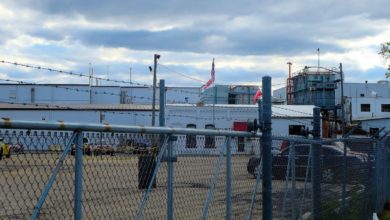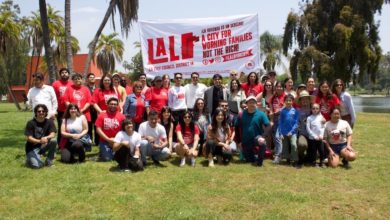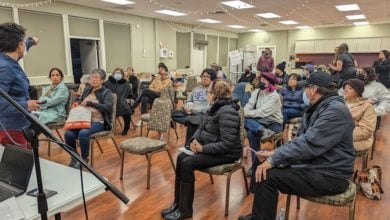It was standing room only as hundreds of working class people in South Central Los Angeles packed a community forum this past Saturday at Holman United Methodist Church. Organized by Stand Together Against Neighborhood Drilling, a coalition of faith-based, environmental justice and community organizers, the crowd demanded an immediate ban on oil drilling and extraction within 2,500 feet of their families’ homes, schools, parks, places of worship and healthcare facilities. STAND-LA’s more general goals include demands that their City’s Mayor, Eric Garcetti, and the majority of council members from L.A.’s fifteen districts push through funding to clean up toxic contaminants in their communities, end environmental racism in their neighborhoods, and fund job-creation programs for clean, sustainable energy instead.
Los Angeles is the largest “urban oil field” in the United States, with over 5000 active oil wells, according to the Liberty Hill Foundation, one of the supporting members of STAND-LA. Most critically, over 800 of these wells are with 1500 feet of working families. This means that working people and their children are constantly breathing and ingesting toxic chemicals and particulates that include benzene and formaldehyde, known carcinogens.
Currently over a quarter million people – mostly poor, people of color – live within half a mile of L.A.’s 5000 plus oil wells. Oil Industries are actively increasing their extraction programs specifically within these overcrowded, urban areas, putting local communities at risk, as gas and oil profit opportunities continue to decline.
Neither Mayor Garcetti, nor represtatives from any of California’s many oil, coal or gas industries attended, however, four city officals did. City Council President Herb J. Wesson, Jr., City Councilor Marqueece Harris-Dawson, Assembly member Reginald Jones-Sawyer, and Assembly member Sydney Kamlager-Dove heard first-hand the deadly results of communities living so close to these toxic sites. Activist Don Martin recounted his granddaughter’s daily struggle with Hodgkin’s lymphoma, living nextdoor to a toxic waste disposal site. Lillian, a Latina community organizer focused on shutting down oil extraction in her neighborhood, spoke about burying her husband this year after he lost a long battle with cancer.
The spirit in the meeting, however, was not grim; it was in fact, highly class conscious: one high school student demanded the council members immediately fund clean energy jobs in solar and wind power; Latina and African American activists chanted “No Drilling Where We’re Living” and “We Can’t Breathe” – tying environmental racism to larger, national struggles to end police violence and jail killer cops. In fact, the government officials present repeatedly credited all progress to end urban oil drilling – and their very attendance at this Saturday forum – to the years of tireless organizing and relentless pressure this community continues to exert on the government. The community’s commitment to standing up and fighting back collectively was best summed up by one, older African American woman who said, “I didn’t work 30 years in my community just to die of lung cancer in retirement!”
Last year, in Wilmington, the ANSWER Coalition marched with thousands of protesters, demanding “No expansion or merger for Tesoro Oil Refinery!” Without a united fight back from the community that lives and works around it, the Tesoro Oil Refinery will continue in its attempts to make itself the West Coast’s largest refiner of dirty tar sands from Canada and North Dakota oil fields.





